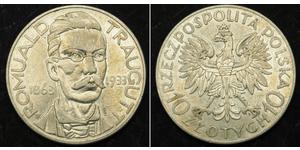10 Zloty (Vendue pour $51.0)
1935, Poland (2nd Rep.). Large Silver 10 Zlotych "Jozef Pilsudski" Coin. XF-AU!
Mint Year: 1935 Reference: KM-29. Mint Place: Warsaw Denomination: 10 Zlotych - Jozef Pilsudski Condition: Minor deposits, otherwise XF-AU! Material: Silver (.750) Weight: 21.91gm Diameter: 32mm
Obverse: Uniformed bust of Józef Klemens Piłsudski left.
Reverse: Crowned white eagle surrounded by light. Legend around, date and denomination below. Legend: RZECZPOSPOLITA POLSKA / 1935 / 10 ZLOTYCH 10
Józef Klemens Piłsudski (5 December 1867 – 12 May 1935) was a Polish statesman; he was Chief of State (1918–22), "First Marshal of Poland" (from 1920), and de facto leader (1926–35) of the Second Polish Republic, Minister of Military Affairs. From mid-World War I he had a major influence in Poland's politics, and was an important figure on the European political scene. He was the person most responsible for the creation of the Second Republic of Poland in 1918, 123 years after it had been taken over by Russia, Austria and Prussia.
Describing himself as a descendant of the culture and traditions of the Polish-Lithuanian Commonwealth, Piłsudski believed in a multicultural Poland - a home of nations, recognizing numerous ethnic and religious nationalities and finally existing in strong historical alliance with independent states of Lithuania and Ukraine. His main opponent Roman Dmowski by contrast called for an independent state of Poland narrowed to the lands of historical Crown and founded mainly on an ethnically Polish demos and Roman Catholic identity.
Early in his political career, Piłsudski became a leader of the Polish Socialist Party. Concluding that Poland's independence would have to be won by force of arms, he created the Polish Legions. In 1914 he anticipated the outbreak of a European war, the Russian Empire's defeat by the Central Powers, and the Central Powers' defeat by the western powers. When World War I broke out, he and his Legions fought under Austrian army control against Russia. In 1917, with Russia faring badly in the war, he withdrew his support from the Central Powers and was arrested by the Germans.
From November 1918, when Poland regained independence, until 1922 Piłsudski was Poland's Chief of State. In 1919–21 he commanded Poland's forces in six border wars that shaped the nation of Poland. His forces seemed almost defeated in the Polish-Soviet War when they fought the battle for Warsaw in August 1920. In the "miracle on the Vistula," they routed five Russian armies and saved Poland. In 1923, with the government dominated by his opponents, particularly the National Democrats, he withdrew from active politics. Three years later, he returned to power with the May 1926 coup d'état, and became the strongman (in practice a military dictator) of Poland. From then until his death in 1935, he concerned himself primarily with military and foreign affairs.
Piłsudski pursued, with varying degrees of intensity, two complementary strategies, intended to enhance Poland's security: "Prometheism", which aimed at breaking up, successively, the Imperial Russia and later the Soviet Union into their constituent nations; and the creation of an "Intermarium" federation, comprising Poland and other independent states located in the geographical space between the Baltic Sea and the Black Sea and geopolitically placed between Germany and Russia. The Intermarium's main purpose was to guarantee a lasting balance of power in Central Europe and to secure the existence of its nations against both western and eastern imperialism.
Between 1945 and 1989, Piłsudski's person and his record were one of the multiple topics forbidden by the Polish communist regime. Wandycz characterizes him as "an ardent Polish patriot who on occasion would castigate the Poles for their stupidity, cowardice, or servility. He called himself a Polish Lithuanian, and was stubborn and reserved, loath to show his emotions." Today, although some aspects of his rule remain controversial, Piłsudski's memory is held in high esteem in Poland. Together with his opponent Roman Dmowski he is regarded as a father of the modern Polish nation.
Only 1$ shipping for each additional item purchased!

|
Posté par:
anonymous 2019-10-30 |
|
||
|
||
|
||
|
||
|
||
5 Franc Second Empire (1852-1870) Argent Napoleon III (1808-1873)
Le groupe a 96 pièces / 88 prix
⇑

-600-300-Cj4NohwXj9kAAAFu6llNOxtE.jpg)

-300-150-gvQKX9ISD3cAAAFULgsoa2CR.jpg)
 Deutsch
Deutsch Русский
Русский Українська
Українська English
English Italiano
Italiano Français
Français Español
Español 汉语
汉语






-300-150-F5YKbzbicOIAAAFLrTOjltwf.jpg)






